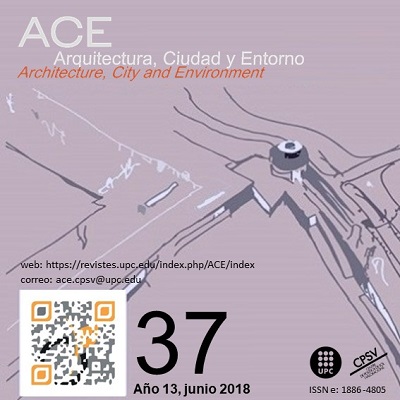Territorial centrality and functional specialization as a guide for managing of conservation areas. The case of the Madrid Urban Region
DOI:
https://doi.org/10.5821/ace.13.37.4904Keywords:
heritage, spatial and functional dimension, spatial planning, multicentric urban regionAbstract
Objective
Which is the role of towns and cities with conservation areas in the context of the urban system and/or emerging multicentre urban regions? What are the implications -opportunities and threats- of metropolitan dynamics in this type of towns/cities? With the attention paid on these questions and based on a spatial and a functional analysis, this paper aims in providing new criteria to debate on managing of municipalities with conservation areas taking into account the urban/metropolitan system which they are part.
Methodology
Taking the madrilenian urban region as the case of study and the municipality as the unit of analysis, three aspects regarding spatial and functional features are studied: (i) the spatial patterns of population and employment, as well as the city-ranking; (ii) the territorial centrality as a result from the trajectories (historical status), the political-administrative role and the current economic status (economic centres); and (iii) the functional specialization.
Conclusions
The study concludes with a typology of the municipalities with Historic-Artistic Grouping based on spatial and functional dimensions. This typology functions as a tool that allows to the identification of different opportunities and threats to be considering in city planning and regional planning.
Originality
The knowledge generated guides future strategies to be implemented in municipalities with conservation areas and, at the same time, contributes to integrate the heritage issue in new development projects/plans.
Downloads
Published
Issue
Section
License
| INTELECTUAL PROTECTION CRITERIA |
At this moment, it is count with the "Oficina Española de Patentes y Marcas", while global protection it is being processed by the World Intelectual Property Organization (OMPI/WIPO). Nevertheless the International Standard Serial Number Office (ISSN) has given the following numbers ISSN: 1886-4805 (electronic version) and 1887-7052 (paper version). All articles will be peer reviewed, using double blind reviewing. |
| COPYRIGHT |
The article contents and their comments are authors exclusive liability, and do not reflect necessarily the journal editor commitee's opinion. All ACE published works are subject to the following licence CC BY-NC-ND 3.0 ES http://creativecommons.org/licenses/by-nc-nd/3.0/es/ It implies that authors do not hold nor retain the copyright without restrictions but only those included in the licence. |


































